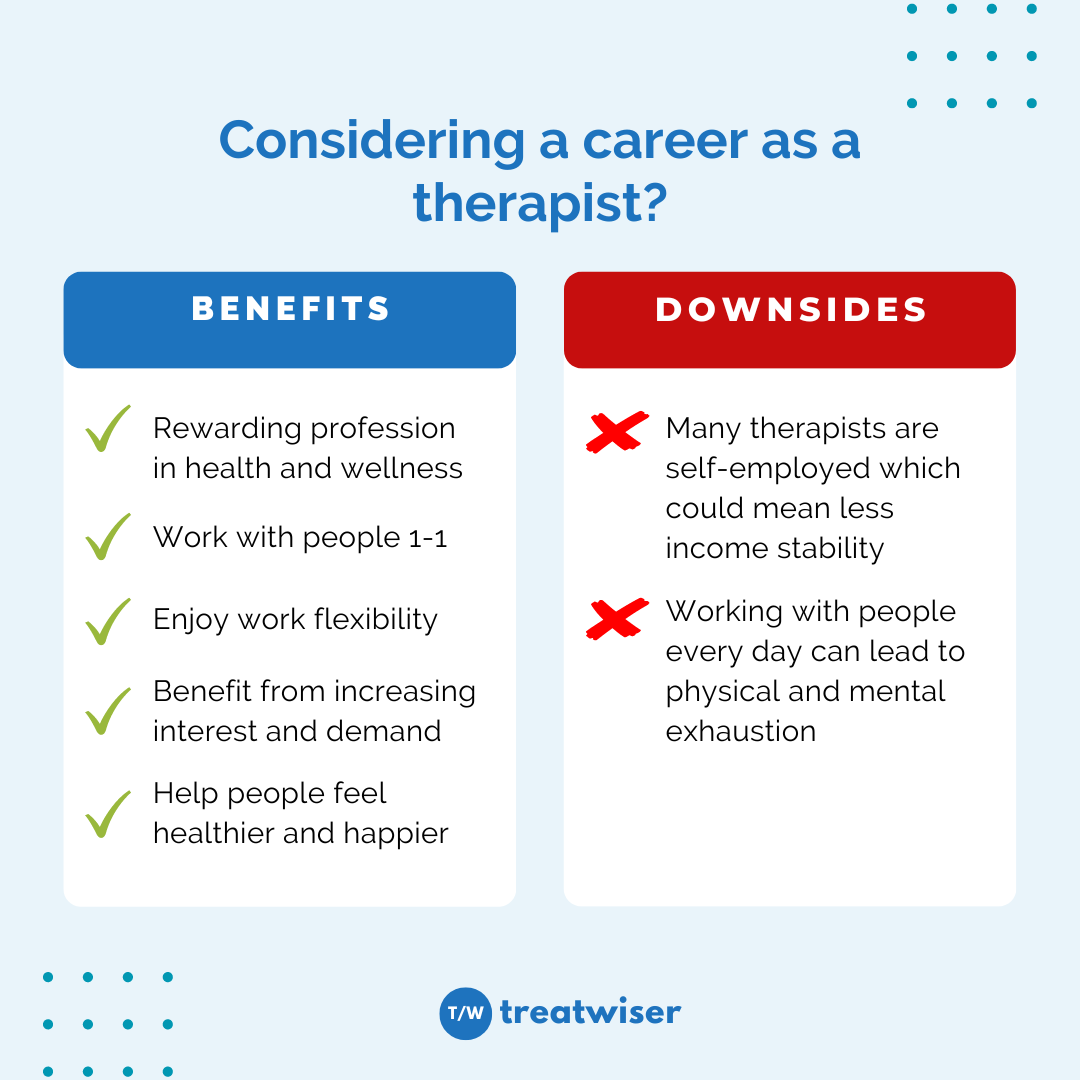Do you dream of working in a job that honours the body’s natural healing ability?
Complementary therapy jobs are growing in popularity in the UK and offer flexibility, freedom, and a range of benefits.
Today, we discuss the pros and cons of working as a complementary therapist. You’ll also learn about the diverse job opportunities available and what you can expect to earn.
What do complementary therapists do?
Complementary therapy encompasses a range of therapies and techniques that support wellness without invasive procedures or pharmaceutical drugs.
Therapists provide a supportive environment that addresses patients’ physical, mental, spiritual, and emotional health. This may include addressing specific health complaints or working with people to reduce stress and improve general well-being.
Complementary therapists do not diagnose or cure any health conditions. Instead, they complement conventional medical treatments.
Some common complementary therapies include massage therapy, nutritional therapy, applied kinesiology, shiatsu, craniosacral therapy, reflexology, reiki, hypnotherapy, homoeopathy, acupuncture, aromatherapy, osteopathy, and chiropractic.
What are the benefits of finding a complementary therapy job?
Working in the complementary therapy field is rewarding for those with a passion for health and wellness and who enjoy working with people one-on-one.
Most complementary therapists in the UK are self-employed, making it ideal for people who want flexibility and to control their own business. The growing demand for, and the wide range of therapies available, make this a great career opportunity in the UK.
You get to help people feel happier and healthier – what’s better than that?!
What are the downsides of a complementary therapy job?
Complementary therapy has its downsides that you should consider before deciding on this as a career.
Most complementary therapists are self-employed, and your income can be inconsistent depending on how many clients you have each month. In addition, you won’t earn an income when you’re ill or off work due to life circumstances.
Working with people every day (many of whom may be unwell) can become physically and emotionally exhausting. This may be an issue if you are a natural introvert.

What skills should a complementary therapist have?
Working as a complementary therapist requires the following skills:
- A passion for health and wellness
- A compassionate and empathetic approach
- Good listening skills
- Confidence
- Being able to relate to other people
What qualifications do you need to be a complementary therapist?
Jobs in complementary therapy have unique training and qualification requirements.
For example, to qualify as a chiropractor in the UK requires completing a 4-year degree. Osteopaths must complete a 4-5-year honours degree. Applied kinesiologists typically complete a 3-month in-person diploma course.
Most complementary therapies aren’t regulated by law. So, voluntary professional regulatory organisations ensure that complementary therapists abide by professional standards.
You can research the specific training requirements of the therapy you choose including relevant complementary therapy courses by searching on the following regulatory websites or reading this article:
- The General Regulatory Council for Complementary Therapies
- The Complementary and Natural Healthcare Council
How much do complementary therapists get paid?
Complementary therapists typically charge hourly or per treatment. This differs for each therapist.
On average, established complementary therapists earn between £20,000 – £43,000 per year. Where you fall on this scale depends on your qualifications, experience, location, and the demand for your skills.
In addition, how much you earn depends on if you are working part-time or full-time and your running costs and overheads.
How do I find complementary therapy jobs?
So, what are the job prospects for a complementary therapist?
Most complementary therapists work from home, from an office space, or in a shared practice with other complementary therapists. Self-employed complementary therapists may also give talks and offer workshops to corporates.
However, it’s tricky building your client base when you start. Having a website and social media channels are good ways to find clients. Here’s a guide we put together on how to find new clients as a complementary therapist.
If you prefer to work with or for someone, positions may be available in GP surgeries, in a hospital setting, at a spa or gym, in a hotel, or on a cruise ship. The NHS Jobs website, LinkedIn, and Simply Hired are helpful places to find jobs in the field.
In addition, some regulatory bodies may advertise job opportunities:
- British Acupuncture Council
- British Chiropractor Association
- General Hypnotherapy Register
- Association of Reflexologists
Approaching your local spa or complementary therapy centre and asking if cathey have any positions available is another way you could find the job of your dreams.



